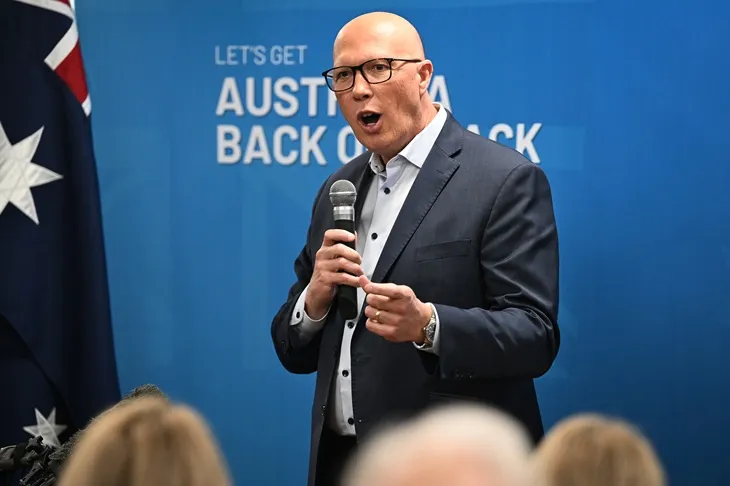The following was published in the Spectator Australia on the 20th of May 2024. You can see the article on their website here.
Right now, everyone’s offering free advice to the Liberal Party. Every commentator, factional operative, and backbench whisperer has a theory. There’s been hand-wringing from moderates, finger-pointing from conservatives, and endless declarations about what went wrong, what we must do, and who should take the blame. The atmosphere is emotional, reactive, and in many cases, completely devoid of political clarity. The truth is, we’re not just dealing with a campaign failure. We are confronting a party-wide identity crisis – and we’re responding to it with vague gestures and empty words.
You don’t rebuild a party by talking in clichés about ‘diversity’, ‘changing demographics’, and ‘modernisation’ while refusing to name a single policy that might need to be defended or discarded. You don’t renew a political movement by outsourcing your convictions to internal reviews and focus groups. And you certainly don’t win elections by becoming an echo of the very party you’re meant to oppose.
Senator James McGrath’s recent interview on ABC’s 7.30 encapsulated everything that’s wrong with the Liberal Party’s post-election soul-searching. It was a masterclass in saying everything and nothing. He spoke of the need for a serious review, about being ‘fit for purpose’, about changing demographics, and about young people not going to branch meetings. But when pressed on any specific policy – especially climate – he demurred. Everything, apparently, is ‘up for review’. It’s a holding pattern masquerading as strategy. A kind of policy purgatory where ideas are neither defended nor discarded, only deferred.
There’s a fundamental dishonesty in this approach. It pretends to be open-minded and reflective, but in reality it’s evasive. It masks factional manoeuvring behind the language of modernisation. And it refuses to engage with the one question voters keep asking: what does the Liberal Party actually stand for?
If Peter Dutton wants a lesson in how to lead with clarity and conviction, he doesn’t need to look far. During the Voice to Parliament referendum, he was resolute, consistent, and confident. He articulated a coherent national position. He didn’t shrink from the debate. He didn’t apologise for believing in something. He fought – and he won. When the referendum was first floated, public support sat somewhere around 70 to 80 per cent in support. It was seen as inevitable. But Dutton marshalled the argument, the movement, and the party. He listened to conservatives. He mobilised Australians. He led a cause he believed in. The result: a decisive ‘No’ vote, delivered not by cowardice or calculation, but by courage.
And then, inexplicably, he walked away from that version of himself. Since the referendum, Dutton seemed increasingly uncertain. It’s as if someone whispered in his ear that winning the cultural argument was a fluke – and that he’d better get back in line. He dulled the edges. Watered down the message. Paired his stern exterior with centrist mush. And unsurprisingly, it failed. Australians don’t mind a bit of toughness in their leaders. What they resent is inauthenticity. You can’t pretend to be a conviction politician while speaking like a department head reviewing a strategic planning document.
So, for what it’s worth here’s my free advice given that everyone else has had their say:
The core mistake here is thinking the Liberal Party’s path to relevance lies in becoming a more palatable version of the Labor Party. That is not victory. That is retreat. Australians already have a Labor Party. They don’t need another one. If we keep trying to mimic their tone, their policies, and their philosophy – just with better spreadsheets and an outsourced public service – then we’ve already lost. Worse, we’ve surrendered the fight without even entering the ring.
The answer isn’t a cautious shuffle toward the so-called ‘Sensible Centre’ that barren strip of political real estate where conviction goes to die. We don’t need balance for its own sake – we need belief. And we need leaders prepared to defend that belief, even when it’s difficult. John Howard didn’t govern by polling. He introduced reforms that were, at times, deeply unpopular – the GST, waterfront reform, gun control – and yet they endured, because they were grounded in principle and executed with purpose. That’s what real leadership looks like. You take the hits. You explain the vision. And in the end, you earn respect, not by agreeing with the mob, but by defeating the moment.
The Liberal Party’s future won’t be saved by internal reviews, brand refreshes, or TikTok brain-rot. It will be saved by a return to authenticity – a politics of conviction. A politics that’s willing to lose a news cycle if it means winning the country back. Australians are craving leadership, not marketing. They want to know that there’s still a party willing to fight for free enterprise, personal responsibility, national identity, Western Civilisation and the institutions that hold our society together.
Until we find the courage to fight for those things – to believe in them, to articulate them, and to carry them unapologetically into the public square – we’ll continue to drift. And if that happens, the biggest loss won’t be at the ballot box. It’ll be moral. We will have forfeited the very purpose of our existence and doomed the people of Australia to a slow, suffocating socialist malaise.
Blake Keating is a member of the NSW Liberal Party State Executive and a former President of the Australian Liberal Students’ Federation.

